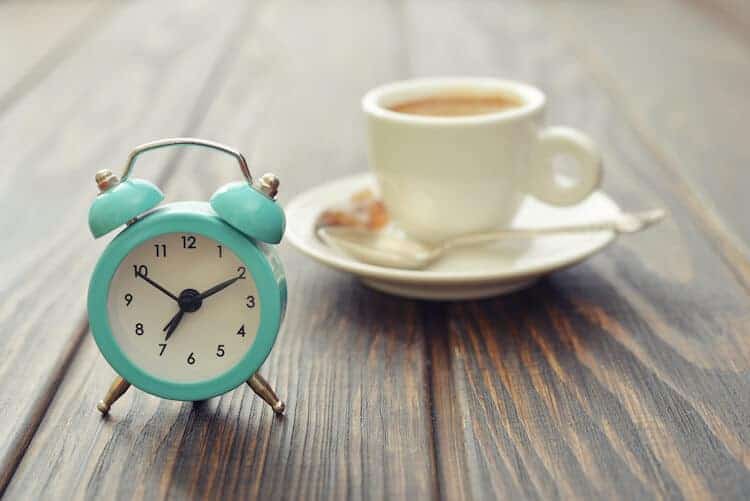When Is the Best Time to Drink Coffee?

Are you a coffee connoisseur? Are you trying to live a healthier life without giving up your cup of joe? If so, you may be wondering when is the best time to drink coffee.
Coffee isn’t just a delicious beverage that many people love. It can impact your sleeping habits, productivity, and hormones.
That’s why it’s so important to drink coffee at the right time for you. I’ve put together some facts to help you decide when to drink coffee and when to drink something else.
Coffee and Cortisol: What’s the Connection?
If you’re like many java drinkers, you turn to coffee in times of stress. After all, it is a familiar comfort. However, worrying times may be the worst time to drink a caffeinated cup of coffee.
A study published by the National Institutes of Health found that caffeine increases cortisol production. Some amount of cortisol is healthy; however, your body needs to maintain a delicate balance.
Cortisol is often called the “stress hormone” because our bodies produce it when we are in danger. It helps us active the fight-or-flight response and respond to crises better. However, too much cortisol can lead to an array of issues.
If you drink coffee while under stress, you get cortisol from both the stress and the coffee. The increase in cortisol leads to more of the stress hormone than your body needs. Too much cortisol can cause anxiety, depression, sleep issues, weight gain, and even heart disease.
If you still need the ritual of the cup of coffee to get you through a difficult moment, opt for a decaf brew.
Why Drink Coffee in the Morning?
A mug full of hot coffee first thing in the morning is an American tradition, but it might not be the healthiest choice. Waiting a few hours after getting out of bed could make your coffee habit healthier.
Science writers at Penn State University considered the most effective time to drink coffee. They argue that because cortisol levels are highest in the morning, it’s best to wait until late morning to drink any caffeine because cortisol wakes you up much the way coffee can.
Your body has a natural ebb and flow of its hormones, including cortisol. Cortisol levels tend to spike around the time you wake up, eat lunch, and get ready for bed. To avoid doubling up on cortisol, try to drink caffeine during the other times of the day.
Penn State research says that the most efficient times to drink coffee for the average person are between 10 a.m. and 12 p.m. and between 2 p.m. and 5 p.m. This helps spread the caffeine and cortisol throughout the day for a steady and efficient day.
Is It Bad to Drink Coffee at Night?
We’ve discovered that you shouldn’t start drinking coffee until about 10 a.m., a few hours after waking, but when should you stop? Most people believe they should avoid coffee right before bed, but exactly how long before bed you should stop consuming coffee is another question.
Another study published by the National Institutes of Health discovered that caffeine could impact your sleep if it is consumed even six hours before bedtime. That means that if you turn the light out at 11 p.m., you should stop drinking anything with caffeine by 5 p.m.
Drinking coffee during the six hours before sleep can lead to plenty of adverse effects. If you drink coffee in the evening, you may experience a loss in total hours of sleep, trouble falling asleep, and less restful sleep.
Not only can the lack of sleep make you tired and more dependent on coffee, but it can also harm your health in surprising ways. Researchers at Harvard have found that insufficient sleep can lead to an increased risk of chronic illness.
You Don’t Have to Cut It Out
After reading all of this, you may be afraid to touch coffee again. You may be thinking, “maybe the best time to drink coffee is never.” Fear not, my java-loving friend. Coffee has plenty of health benefits if you drink it at the right times.
A study from the National Cancer Institute found that coffee drinkers are less likely to die from stroke, diabetes, infections, heart disease, and more. Although we don’t yet know exactly why coffee drinkers experience this benefit, researchers say it could be any of the over 1,000 compounds in the drink.
If you’re trying to create or maintain a healthy lifestyle, you don’t have to lose your coffee habit. However, you might want to consider adjusting it just a bit.
Drink coffee in the late morning and afternoon, skip it when you’re stressed, and stop at least six hours before bedtime. With these tips in mind, you will be able to reap the benefits of coffee drinking without losing sleep and increasing cortisol.
